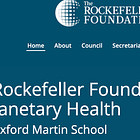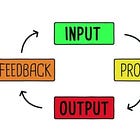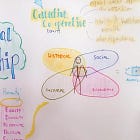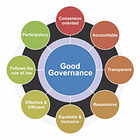Planetary Management of Planetary Health
In 2016, the World Wide Fund for Nature introduced the Codex Planetarius1, a blueprint for the planetary management of planetary health. While its vision was comprehensive and seemingly aligned with ‘The Great Transition’2 through its path toward planetary stewardship, it fell short of detailing how this vision would be translated into reality.
And that’s exactly what this post aims to address.
The integration of science and ethics as core drivers of planetary governance, enables the shaping of a centralised global management system. Drawing on Alexander Bogdanov’s systems thinking3, Vladimir Lenin’s operational pragmatism, and contemporary global frameworks4, this post examines the interplay of science, ethics, and governance in driving Conscious Evolution toward Teilhard de Chardin’s Omega Point.
It further incorporates key initiatives like the Codex Planetarius5, frameworks such as the Total Human Ecosystem and Adaptive Management, and the macroeconomic role of the Bank for International Settlements (BIS). While this integration offers a coordinated path to planetary stewardship, the centralisation of power and influence raises critical concerns about its potential for abuse.
Introduction
The modern trajectory of global governance increasingly reflects the integration of science, ethics, and adaptive management as the foundation for directing societal evolution6. This triad, which forms what may be termed the Science-Ethics-Governance Nexus, provides the structural coherence necessary for addressing planetary stewardship7 in a world characterised by complexity and interdependence. Science defines the objectives, ethics compel the alignment of societal behavior with these objectives, and governance operationalises these directives through coordinated institutional frameworks.
A notable practical application of this integration is the Codex Planetarius, an initiative to establish mandatory environmental performance standards. This framework exemplifies how scientific outputs are synthesised into planetary ethics8 and subsequently transformed into enforceable regulations. The Codex Planetarius extends the principle of the Codex Alimentarius, which sets global food safety standards, into the domain of environmental governance, targeting the health of renewable resources impacted by agriculture. Its implementation represents a critical step in embedding planetary ethics into trade and resource management systems, reflecting the broader themes of integration and centralisation.
The theoretical foundations of this framework can be traced to Alexander Bogdanov9 and Vladimir Lenin10, whose ideas provide complementary approaches to systemic organisation and transformation. Bogdanov’s Tektology emphasises the interconnectedness of systems, offering a structure for integrating societal functions. His early concepts of Input-Output Analysis11 are reflected in modern tools like Digital Twins12, which through data provided as Global Surveillance ‘indicators’13, provide real-time feedback for managing the Total Human Ecosystem14—a framework encompassing the socio-ecological system of humanity, the biosphere, and the geosphere. Lenin’s New Economic Policy (NEP) complements Bogdanov’s structural insights by operationalising ethics through transitional policies that balance centralised control with economic adaptability.
The concept of the Omega Point15, proposed by Teilhard de Chardin, provides the teleological vision for this framework. It envisions humanity evolving toward greater unity and complexity through the alignment of science, ethics, and governance. This process is supported by Adaptive Management, a crucial component of the Fourth Industrial Revolution16 which incorporates feedback loops, iterative learning, and flexibility into decision-making processes, ensuring that the governance structure remains resilient in the face of uncertainty.
These elements—science, ethics, governance, and supporting frameworks like the Codex Planetarius—interact to create a system for planetary stewardship. While the promise of coordinated global action is compelling, the centralisation of power and influence within this framework raises questions about its implications.
The Science-Ethics-Governance Nexus
Science as the Foundational Driver
Science serves as the primary source of direction within the Science-Ethics-Governance Nexus, providing predictive capabilities and data-driven insights to identify global priorities. Institutions like the International Science Council (ISC)17 and Collegium International18 synthesise these outputs into actionable knowledge, shaping planetary ethics that align with systemic goals such as sustainability and intergenerational equity.
Modern tools like Digital Twins operationalise Bogdanov’s Input-Output Analysis by simulating planetary systems, enabling dynamic decision-making and resource allocation. These technologies are increasingly integral to frameworks like the Codex Planetarius, which uses scientific findings to establish global environmental benchmarks.
Ethics as the Directive Mechanism
Ethics19 derived from scientific insights act as moral imperatives for action20, compelling alignment across societal systems. Planetary ethics are embedded into cultural, educational, and economic systems through institutions like UNESCO21, WAAS, and OECD, ensuring a consistent and enforceable framework.
The Codex Planetarius is a prime example of how ethics are transformed into regulatory mechanisms. By setting mandatory environmental performance standards for food production, it ensures compliance with sustainability principles while promoting the health of renewable resources. The Codex functions not only as a tool for governance but also as an embodiment of ethical accountability on a global scale22.
Governance as the Implementation Mechanism
Governance structures translate science and ethics into enforceable policies through organisations like the Institute of Noahide Code23 and the United Nations. And the potential for macroeconomic governance through institutions like the Bank of England24 or eventually even the Bank for International Settlements (BIS)25 expands this framework into the economic domain.
Total Human Ecosystem and Planetary Stewardship
The Total Human Ecosystem integrates human, ecological, and planetary systems into a single socio-ecological framework. It emphasises the interconnectedness of human activity, the biosphere, and the geosphere, providing a holistic perspective on planetary stewardship.
One Health and the Ecosystem Approach
The One Health26 framework addresses the interconnected health of humans, animals, and ecosystems, operationalising planetary ethics within the biosphere. The Ecosystem Approach27 focuses on the geosphere, promoting sustainable landscape management and resource use. These frameworks reflect the principles of the Codex Planetarius, aligning resource management with ethical and scientific imperatives.
Conscious Evolution and the Omega Point
Conscious evolution represents humanity’s progression toward higher complexity and unity, guided by the alignment of science, ethics, and governance. The Omega Point serves as the ultimate vision of this evolution, where systemic coherence and ethical alignment culminate in a state of planetary and spiritual unity.
Critical Perspectives on Centralisation
Risks and Challenges
Technocratic Dominance:
The reliance on science and ethics as the primary drivers of governance risks sidelining alternative perspectives.Monopolisation of Influence:
Initiatives like the Codex Planetarius and institutions like the BIS wield significant power, raising concerns about the centralisation of authority.Cultural Homogenisation:
Embedding planetary ethics into global systems may suppress localised values, creating a singular ethical framework that prioritises systemic coherence over regional autonomy.
Conclusion
The integration of science, ethics, and governance through frameworks like the Codex Planetarius, Total Human Ecosystem, and Adaptive Management represents a significant step toward coordinated planetary stewardship. These frameworks centralise authority, leveraging science to define priorities, ethics to enforce alignment, and governance to implement policy. However, the concentration of power within this system raises important questions about its potential for abuse, including its capacity to drift toward authoritarianism28.
This centralisation is not merely a matter of efficiency but also one of influence and control, as the system embeds planetary ethics into key societal pillars—religion, business, education, culture, and governance29. Through these mechanisms, the governance structure develops a self-sustaining system that fundamentally answers to no one, creating a global framework where oversight and accountability become increasingly opaque.
Religion
Religious organisations, including the Parliament of the World’s Religions30, the Vatican31, and the Universal House of Justice, play a critical role in embedding planetary ethics into moral and spiritual teachings. By aligning religious frameworks with global governance priorities, these institutions ensure widespread compliance through moral persuasion. However, this alignment also consolidates the ability to dictate moral standards under the guise of universal ethics, potentially silencing dissenting theological interpretations and spiritual diversity. The encoded morality effectively reinforces the system’s directives, making them appear divinely sanctioned and thus beyond reproach.
Business
Corporate influence through initiatives like Environmental, Social, and Governance (ESG) frameworks and Corporate Social Responsibility (CSR) integrates planetary ethics into economic systems32. Institutions such as the World Economic Forum (WEF) and the OECD operationalise these ethics, creating financial incentives for compliance, though these increasingly shift towards mandates. While this ensures alignment with global priorities, it also centralises economic power by favoring corporations that adhere to these frameworks, marginalising smaller players and dissenting economic models. This creates an economic system that mirrors the governance structure, where ethical compliance becomes a prerequisite for economic participation, leaving little room for alternative approaches.
Education
Through institutions like UNESCO, planetary ethics are embedded into education systems worldwide, shaping the values and priorities of future generations. This ensures a global cultural alignment with governance priorities, but it also risks homogenising education and suppressing intellectual diversity. By controlling the narrative on ethics and sustainability, the system ensures that alternative perspectives are set aside, creating a self-reinforcing cycle where future leaders are conditioned to perpetuate the status quo.
Culture
The role of culture, mediated by organisations such as the World Academy of Art and Science (WAAS) and movements like Proletkult, extends the reach of planetary ethics into arts and public consciousness. By shaping cultural narratives to reflect governance priorities, these institutions ensure that the system is seen as not only necessary but inevitable. However, this cultural alignment can also marginalise dissenting voices, turning the arts into a tool for reinforcing the governance framework rather than challenging it.
Governance
The system’s governance structures33, exemplified by the United Nations, the Codex Planetarius, and macroeconomic institutions like the Bank for International Settlements (BIS), enforce planetary ethics through binding legislation, global standards, and economic policies. This consolidation of authority ensures uniformity in addressing global challenges but also creates a governance framework that is insulated from traditional checks and balances34. By operating at a global level, these institutions remain largely unaccountable to local populations, effectively answering to no one.
A Self-Reinforcing System
The integration of religion, business, education, culture, and governance creates a system that is not only centralised but self-reinforcing. Each pillar validates and supports the others, embedding planetary ethics so deeply into societal structures that questioning the system becomes increasingly difficult. Religion moralises the ethics, education normalises them, business operationalises them, culture celebrates them, and governance enforces them. Together, these elements create a closed loop of compliance, leaving no room for alternative perspectives or mechanisms of accountability.
Implications
This self-sustaining framework has profound implications for global governance35. While it offers an efficient and coordinated approach to planetary stewardship, it also risks creating a system that operates beyond the reach of traditional accountability mechanisms. The lack of external oversight or meaningful checks on its power means that this system, despite its ethical underpinnings, could easily be used to suppress dissent, homogenise culture, and prioritise the interests of those who control its levers.
Ultimately, while the integration of science, ethics, and governance holds the potential to address global challenges effectively, it also introduces significant risks. The potential for this framework to evolve into a self-perpetuating system that fundamentally answers to no one underscores the need for critical examination and robust safeguards to ensure that it remains accountable to the populations it seeks to serve. Without such safeguards, the promise of planetary stewardship could give way to a form of global governance that prioritises control over equity, and compliance over true accountability.
… immediately following the 1968 UNESCO Biosphere Conference.36









































While we were playing video games, they were creating a world where we are nothing but in the way and must be controlled. We need to go back to the withway or humanity will never be the same and will be recreated in the image of the machine and God will be just an afterthought, no thanks, but how do you wake up western nations to the fact they are under attack and being invaded as a cover for an AI Technocracy takeover.
Superb - shared - thank you.